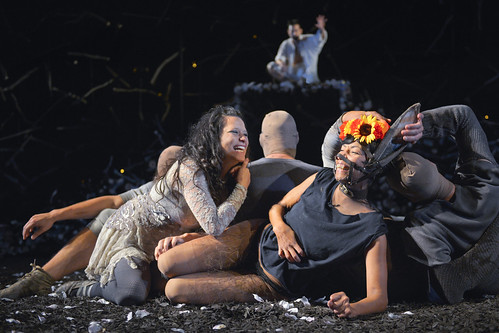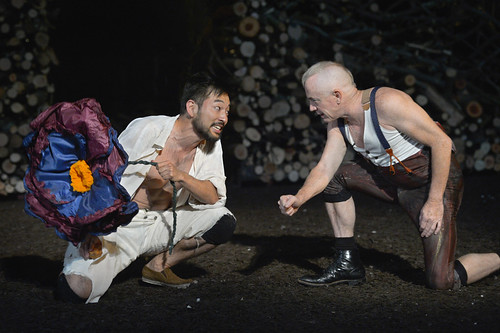Cal Shakes ends season with a vibrant Dream
 Erika Chong Shuch (left) is Titania, queen of the fairies, and Margo Hall is Bottom, a transformed rude mechanical and Daisuke Tsuji (rear) is Oberon a mischievous king of the fairies in the California Shakespeare Theater production of A Midsummer Night's Dream. Below: Tsuji's Oberon and Danny Scheie's Puck figure out how to right all the wrongs they've made with their midsummer meddling. Photos by Kevin Berne.
Erika Chong Shuch (left) is Titania, queen of the fairies, and Margo Hall is Bottom, a transformed rude mechanical and Daisuke Tsuji (rear) is Oberon a mischievous king of the fairies in the California Shakespeare Theater production of A Midsummer Night's Dream. Below: Tsuji's Oberon and Danny Scheie's Puck figure out how to right all the wrongs they've made with their midsummer meddling. Photos by Kevin Berne.
A Midsummer Night's Dream is a landmark play for California Shakespeare Theater. When the company really became the company, then known as Berkeley Shakespeare Company, the first show produced at John Hinkel Park was Midsummer. Since then, the play has been performed seven more times, and now Cal Shakes concludes its 40th anniversary season with a version of the play that feels unlike any other production of it I've seen.
The opening scene, a battle/rough seduction between Theseus (Daisuke Tsuji) and the conquered Hippolyta (Erica Chong Shuch), is a good example of director Shana Cooper's unique approach to the production's tone. It's hard to know whether to credit Shuch, who choreographed the play's movement, or fight director Dave Maier for this dazzling encounter. But that kind of blended work is a hallmark of the production.
There's a vigorous physicality to this Dream, whether it's in the more formal dance moments (music and sound design is by Paul James Prendergast) or the heightened sense of vibrancy that enlivens the work of the forest fairies or the quartet of Athenian lovers who get lost and mightily tangled in the night. Even if there were no dialogue, you'd get a sense of relationships and tensions and emotions just from the way the thoroughly vivacious cast attacks the play.
There is dialogue, of course, and these sturdy actors deliver it as well as they embody the choreography. Margo Hall, for instance completely owns the role of Nick Bottom, the amateur actor who thinks he (or she in this case) should probably play every role in the play he and his friends are preparing for the King's wedding festivities. Bottom is a rich comic role, and Hall finds new laughs in the pompous but lovable thespian, but she also finds the sincerity and the heart. That moment when Bottom, in mid-performance, stops ego acting and starts actually acting is wondrous (there's a similiar performance moment for Craig Marker's Flute, and it's just as sweet).
As if Danny Scheie hadn't impressed enough earlier in the season playing twins in The Comedy of Errors (read my review here) – now he's breathing new life into Puck, chief fairy in charge of forest mischief. Outfitted by designer Katherine O'Neill in sort of a steam-punk ensemble of latex pantaloons, suspenders and sleeveless shirt, Scheie sports a mohawk and an attitude. This Puck still has a twinkle in his eye, but he's also kind of over it and, as they say, can't even. Scheie is hilarious and a little bit renegade – a good mix for Puck.
Audiences rarely leave Midsummer talking about the lovers (it's usually Bottom and Puck), but Cooper's quartet, especially the women, are really something. Hermia (Tristan Cunningham) and Helena (Lauren English) begin and end as friends, but in the middle, with the help of fairy trickery, things get rough. And that's when things get fun. The befuddled men, Lysander (Dan Clegg) and Demetrius (Nicholas Pelczar), get major points for their all-out attack on the physical comedy, but the night belongs to the women, who lament and rage and struggle with all their mighty might. Cooper wants her lovers to get dirty, and boy do they. Set designer Nina Ball covers her forest floor with some sort of softy, dirty kind of material, and when that's not enough, the lovers begin flinging actual mud.
When the hurricane of midsummer magic begins to dissipate, watching the lovers clean themselves up turns out to be one of the nearly 2 1/2-hour production's nicest (and most thoroughly earned) moments.
This is not a colorful Midsummer so much as it is a moody one, but not so moody that it's gloomy. The lights (by Burke Brown) are stark (to go along with Ball's fragmented, woodpile of a forest set) and only occasionally festive. Only at the end, when the lovers end up together and the amateur theatricals begin does color infuse the world of the stage (and Brown lights the trees behind the stage to spectacular effect).
And a word about those amateur theatricals: Hall and Marker, along with Catherine Castellanos, James Carpenter, Liam Vincent and Scheie, deliver the funniest version of The Most Lamentable Comedy and Most Cruel Death of Pyramus and Thisbe I've seen, and Castellanos is the funniest wall, perhaps, of all time.
Even the autumn chill of opening night couldn't diminish the feverish heat generated by this Midsummer Night's Dream. It's got the laughs, the sparks and the moves you only find in the most memorable of dreams.
FOR MORE INFORMATIONCalifornia Shakespeare Theater's A Midsummer Night's Dream continues through Sept. 28 at the Bruns Amphitheater, 100 California Shakespeare Theater Way, Orinda. Tickets are $20-$72. Call 510-548-9666 or visit www.calshakes.org.
